- Home
- Oliver Sacks
On the Move: A Life Page 2
On the Move: A Life Read online
Page 2
—
By the time I was fourteen, it was “understood” that I was going to be a doctor. My mother and father were both physicians, and so were my two eldest brothers.
I was not sure, however, that I wanted to be a doctor. I could no longer nourish ambitions to be a chemist; chemistry itself had advanced beyond the eighteenth- and nineteenth-century inorganic chemistry I loved so much. But at fourteen or fifteen, inspired by my school biology teacher and by Steinbeck’s Cannery Row, I thought I would like to become a marine biologist.
When I got my scholarship to Oxford, I faced a choice: Should I stick to zoology or become a pre-med student and do anatomy, biochemistry, and physiology? It was especially the physiology of the senses that fascinated me—how did we see color, depth, movement? How did we recognize anything? How did we make sense of the world, visually? I had developed these interests from an early age through having visual migraines, for besides the brilliant zigzags which heralded an attack, I might, during a migraine aura, lose the sense of color or depth or movement or even the ability to recognize anything. My vision could be unmade, deconstructed, frighteningly but fascinatingly, in front of me, and then be remade, reconstructed, all in the space of a few minutes.
My little home chemistry lab had doubled as a photography darkroom, and I was especially drawn to color and stereophotography; these too made me wonder how the brain constructed color and depth. I had enjoyed marine biology much as I had enjoyed chemistry, but now I wanted to understand how the human brain worked.
—
I never had much intellectual self-confidence, even though I was regarded as bright. Like my two closest school friends, Jonathan Miller and Eric Korn, I was obsessed with both science and literature. I was in awe of Jonathan’s and Eric’s intelligence and couldn’t think why they hung around with me, but we all got scholarships to university. I then ran into some difficulties.
At Oxford, one had to take an exam called “prelims” for entry; it was considered a mere formality with me, because I already had an open scholarship. But I failed prelims; I took them a second time, and I failed again. I took the test a third time and failed yet again, and at this point Mr. Jones, the Provost, pulled me aside and said, “You did splendid scholarship papers, Sacks. Why are you failing this silly exam again and again?” I said I didn’t know, and he said, “Well, this is your last chance.” So I took the test a fourth time and finally passed.
At St. Paul’s School, with Eric and Jonathan, I could enjoy an easy mix of arts and sciences. I was president of our literary society and secretary of the Field Club at the same time. Such a mix was more difficult at Oxford, for the anatomy department, the science laboratories, and the Radcliffe Science Library were all clustered together in South Parks Road, at a distance from the university lecture halls and colleges. There was both a physical and a social separation between those of us doing science or pre-med degrees and the rest of the university.
I felt this sharply in my first term at Oxford. We had to write essays and present these to our tutors, and this entailed many hours in the Radcliffe Science Library, reading research and review papers, culling what seemed most important, and presenting it in an interesting and individual way. Spending a great deal of time reading neurophysiology was enjoyable, even thrilling—vast new areas seemed to be opening out—but I became more and more conscious of what was now missing from my life. I was doing almost no general reading other than Maynard Keynes’s Essays in Biography, and I wanted to write my own “Essays in Biography,” though with a clinical twist—essays presenting individuals with unusual weaknesses or strengths and showing the influence of these special features on their lives; they would, in short, be clinical biographies or case histories of a sort.
My first (and, in the event, my only) subject here was Theodore Hook, whose name I had come across while reading a biography of Sydney Smith, the great early Victorian wit. Hook too was a great wit and conversationalist, a decade or two earlier than Sydney Smith; he also had, to an unrivaled degree, powers of musical invention. It was said that he had composed more than five hundred operas, sitting at a piano, improvising, and singing all of the parts. These were flowers of the moment—astonishing, beautiful, and ephemeral; they were improvised on the spot, never repeated, never written down, and soon forgotten. I was enthralled by descriptions of Hook’s improvisational genius; what sort of brain could allow for this?
I started reading what I could about Hook, as well as some of the books he had written; they seemed oddly dull and labored, in contrast to descriptions of his lightning-quick, wildly inventive improvisations. I thought about Hook a good deal, and towards the end of the Michaelmas term I wrote an essay on him, an essay which ran to six closely typed foolscap pages, four or five thousand words in all.
I recently found this essay in a box, along with other early writings. Reading it, I am struck by its fluency, its erudition, its pomposity, and its pretentiousness. It does not seem like my writing. Could I have cribbed the entire thing or stitched it together from half a dozen sources, or was it in fact my own writing, couched in a learned, professorial style which I had adopted to counter the fact that I was a callow eighteen-year-old?
Hook was a diversion; most of my essays were on physiological subjects and were to be read weekly to my tutor. When I took on the subject of hearing, I got so excited by this, did so much reading and thinking, that I did not actually have time to write my essay. But on the day of my presentation, I brought in a pad of paper and pretended to read from it, turning over the pages as I extemporized on the subject. At one point, Carter (Dr. C. W. Carter, my tutor at Queen’s) stopped me.
“I didn’t quite follow that,” he said. “Could you read it again?” A little nervously, I tried to repeat the last couple of sentences. Carter looked puzzled. “Let me see it,” he said. I handed him the blank pad. “Remarkable, Sacks,” he said. “Very remarkable. But in future, I want you to write your essays.”
—
As a student at Oxford, I had access not only to the Radcliffe Science Library but to the Bodleian, a wonderful general library that could trace its origins back to 1602. It was in the Bodleian that I stumbled upon Hook’s now obscure and forgotten works. No other library—apart from the British Museum Library—could have provided the materials I needed, and the tranquil atmosphere of the Bodleian was a perfect one in which to write.
But the library I most loved at Oxford was our own library at the Queen’s College. The magnificent library building, we were told, had been designed by Christopher Wren, and beneath this, in an underground maze of heating pipes and shelves, were the vast subterranean holdings of the library.
To hold ancient books, incunabula, in my own hands was a new experience for me; I particularly adored Conrad Gesner’s Historiae animalium (1551), richly illustrated (it had Albrecht Dürer’s famous drawing of a rhinoceros), and Louis Agassiz’s four-volume work on fossil fish. It was in the stacks that I saw all of Darwin’s works in their original editions, and there, too, that I fell in love with all the works of Sir Thomas Browne—his Religio Medici, his Hydriotaphia, and The Garden of Cyrus (The Quincunciall Lozenge). How absurd some of these were, but how magnificent the language! And if Browne’s classical magniloquence became too much at times, one could switch to the lapidary cut and thrust of Swift, all of whose works, of course, were there in their original editions. While I had grown up on the nineteenth-century works that my parents favored, it was the catacombs of the Queen’s library that introduced me to seventeenth- and eighteenth-century literature—Johnson, Hume, Gibbon, and Pope. All of these books were freely available, not in some special, locked-away, rare books enclave, but just sitting on the shelves, as they had done, I imagined, since their original publication. It was in the vaults of the Queen’s College that I really gained a sense of history and of my own language.
—
My mother, a surgeon and anatomist, while accepting that I was too clumsy to follow in her footsteps as
a surgeon, expected me at least to excel in anatomy at Oxford. We dissected bodies and attended lectures and, a couple of years later, had to sit for a final anatomy exam. When the results were posted, I saw that I was ranked one from bottom in the class. I dreaded my mother’s reaction and decided that, in the circumstances, a few drinks were called for. I made my way to a favorite pub, the White Horse in Broad Street, where I drank four or five pints of hard cider—stronger than most beer and cheaper, too.
Rolling out of the White Horse, liquored up, I was seized by a mad and impudent idea. I would try to compensate for my abysmal performance in the anatomy finals by having a go at a very prestigious university prize—the Theodore Williams Scholarship in Human Anatomy. The exam had already started, but I lurched in, drunkenly bold, sat down at a vacant desk, and looked at the exam paper.
There were seven questions to be answered; I pounced on one (“Does structural differentiation imply functional differentiation?”) and wrote nonstop for two hours on the subject, bringing in whatever zoological and botanical knowledge I could muster to flesh out the discussion. Then I left, an hour before the exam ended, ignoring the other six questions.
The results were in The Times that weekend; I, Oliver Wolf Sacks, had won the prize. Everyone was dumbfounded—how could someone who had come one but last in the anatomy finals walk off with the Theodore Williams prize? I was not entirely surprised, for it was a sort of repetition, in reverse, of what had happened when I took the Oxford prelims. I am very bad at factual exams, yes-or-no questions, but can spread my wings with essays.
Fifty pounds came with the Theodore Williams prize—£50! I had never had so much money at once. This time I went not to the White Horse but to Blackwell’s bookshop (next door to the pub) and bought, for £44, the twelve volumes of the Oxford English Dictionary, for me the most coveted and desirable book in the world. I was to read the entire dictionary through when I went on to medical school, and I still like to take a volume off the shelf, now and then, for bedtime reading.
—
My closest friend at Oxford was a Rhodes scholar, a young mathematical logician called Kalman Cohen. I had never met a logician before, and I was fascinated by Kalman’s power of intellectual focus. He seemed able to fix his mind on a problem nonstop for weeks on end, and he had a passion for thinking; the very act of thinking seemed to excite him, irrespective of the thoughts he arrived at.
Though we were so different, we got on very well. He was attracted by my sometimes wildly associative mind, as I was by his highly focused mind. He introduced me to Hilbert and Brouwer, the giants of mathematical logic, and I introduced him to Darwin and the great nineteenth-century naturalists.
We think of science as discovery, art as invention, but is there a “third world” of mathematics, which is somehow, mysteriously, both? Do numbers—primes, for example—exist in some eternal Platonic realm? Or were they invented, as Aristotle thought? What is one to make of irrational numbers, like π? Or imaginary numbers, like the square root of –2? Such questions exercised me, fruitlessly, from time to time, but they were almost a life-and-death matter for Kalman. His hope was to somehow reconcile Brouwer’s Platonic intuitionism with Hilbert’s Aristotelian formalism, their so different yet complementary views of mathematical reality.
When I spoke of Kal to my parents, they immediately thought of how far he was from home and invited him to spend a relaxed weekend, with home cooking, in our house in London. My parents enjoyed meeting him, but my mother was indignant the next morning when she found one of Kal’s bedsheets covered with inky writing. When I explained that he was a genius and that he had used the sheet to work out a new theory in mathematical logic (here I exaggerated a little), her indignation changed to awe, and she insisted on keeping the sheet, unwashed, unerased, in case, on a future visit, Kalman might want to consult it again. She also showed it proudly to Selig Brodetsky, a former Senior Wrangler at Cambridge (and an ardent Zionist), the only mathematician she knew.
Kalman had been at Reed College in Oregon—this, he told me, was known for its brilliant students—and he had been its highest-ranking graduate in many years. He said this simply, unaffectedly, as one might speak of the weather. It was simply a matter of fact. He seemed to think I was bright, too, despite the manifest disorder and illogic of my mind. He felt that bright people should marry each other and have bright children, and with this in mind he arranged for me to meet another Rhodes scholar from America, a Miss Isaac. Rael Jean was quiet, self-effacing, but (as Kal had said) diamond sharp, and we talked high abstractions all through our dinner together. We parted amicably but never saw each other again, nor did Kalman attempt to find me a mate again.
In the summer of 1952, our first long vac, Kalman and I hitchhiked through France to Germany, sleeping at youth hostels on the way. Somewhere we picked up head lice and had to have our heads shaved. A rather elegant friend at Queen’s College, Gerhart Sinzheimer, had invited us to stop by; he was summering with his parents in their house on the Titisee in the Black Forest. When Kalman and I arrived, filthy and bald-headed with a story of catching lice, they ordered us both to have a bath, and they had our clothes fumigated. After a short, awkward stay with the elegant Sinzheimers, we made our way to Vienna (then very much, we thought, the Vienna of The Third Man), and there we sampled every liqueur known to man.
—
Although I was not taking my degree in psychology, I sometimes went to lectures in the psychology department. It was there that I saw J. J. Gibson, a bold theorist and experimenter in visual psychology who had come to Oxford on a sabbatical from Cornell. Gibson had recently published his first book, The Perception of the Visual World, and was happy to let us experiment with special glasses that inverted (in one eye or both) what one normally saw. Nothing was more bizarre than seeing the world upside down, and yet, within days, the brain would adapt to this and reorient the visual world (only to have it appear upside down again when one took off the spectacles).
Visual illusions, too, fascinated me; they showed how intellectual understanding, insight, and even common sense were powerless against the force of perceptual distortions. Gibson’s inverting glasses showed the power of the mind to rectify optical distortions, where visual illusions showed its inability to correct perceptual ones.
—
Richard Selig. It has been sixty years, but I can still see Richard’s face, his bearing—he bore himself like a lion—as I first saw him outside Magdalen College in Oxford in 1953. We got talking; I suspect that it was he who started a conversation, for I was always too shy to initiate any contact and his great beauty made me even shyer. I learned in that first conversation that he was a Rhodes scholar and a poet and had worked at a variety of odd jobs all over the States. His knowledge of the world was far greater than mine, even given the disparity of age (he was twenty-four; I was twenty), far greater than that of most undergraduates who had gone straight from school to university with no experience of real life in between. He found something interesting in me, and we soon became friends—and more, for I fell in love with him. It was the first time in my life I had fallen in love.
I fell in love with his face, his body, his mind, his poetry, everything about him. He would often bring me just-written poems, and I would give him some of my physiology essays in return. I was not, I think, the only one to fall in love with him; there were others, both men and women—his great beauty, his great gifts, his vitality and love of life, ensured this. He talked freely of himself—about his apprenticeship with the poet Theodore Roethke, his friendships with many painters, and the year he himself had spent as a painter before realizing that whatever his talents were, his real passion was for poetry. He would often carry images, words, lines of poetry, in his head, working on them consciously and unconsciously for months on end until they were born as finished poems or abandoned. He had had poems published in Encounter, The Times Literary Supplement, Isis, and Granta and had a great supporter in Stephen Spender. I thought he was a gen
ius, or a genius in the making.
We would go on long walks together, talking about poetry and science. Richard loved to hear me wax enthusiastic about chemistry and biology, and I lost my shyness when I did so. While I knew that I was in love with Richard, I was very apprehensive of admitting this; my mother’s words about “abomination” had made me feel that I must not say what I was. But, mysteriously, wonderfully, being in love, and in love with a being like Richard, was a source of joy and pride to me, and one day, with my heart in my mouth, I told Richard that I was in love with him, not knowing how he would react. He hugged me, gripped my shoulders, and said, “I know. I am not that way, but I appreciate your love and love you too, in my own way.” I did not feel rebuffed or brokenhearted. He had said what he had to say in the most sensitive way, and our friendship continued, made easier now by my relinquishing certain painful and hopeless longings.
I thought we might be lifelong friends, as perhaps he did, too. But one day he came to my digs, looking disturbed. He had noticed a swelling in one of his groins; he had paid no attention to it at first, thinking it would disappear, but it had grown larger and was getting uncomfortable. I was a pre-med student, he said, could I look at it? He pulled his trousers and underpants down, and there it was, the size of an egg, in his left groin. It was fixed and hard to the touch. Cancer was my immediate thought. I said to Richard, “You must see a doctor—it may need a biopsy—don’t delay.”
The gland was biopsied and diagnosed as lymphosarcoma; Richard was told that he could expect no more than two years of life. After telling me this, he never spoke to me again; I was the first to recognize the deadly import of his tumor, and perhaps he saw me now as a sort of messenger or symbol of death.
But he was determined to live as fully as he could in the time remaining to him; he married the Irish harpist and singer Mary O’Hara, went with her to New York, and died fifteen months later. He wrote much of his finest poetry in these last months.

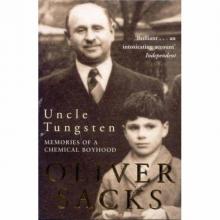 Uncle Tungsten
Uncle Tungsten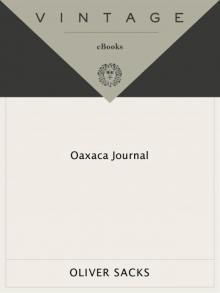 Oaxaca Journal
Oaxaca Journal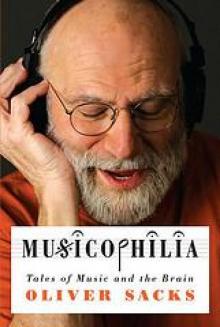 Musicophilia
Musicophilia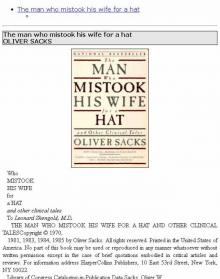 The man who mistook his wife for a hat
The man who mistook his wife for a hat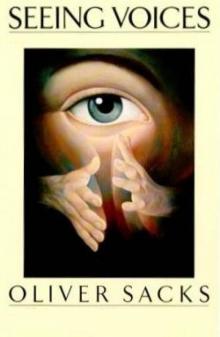 1989 - Seeing Voices
1989 - Seeing Voices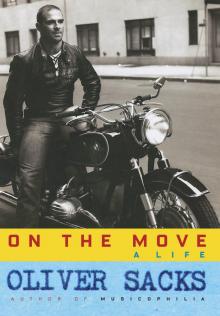 On the Move: A Life
On the Move: A Life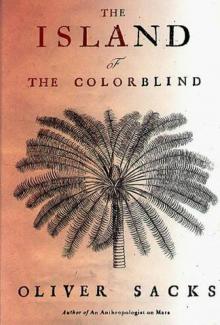 1996 - The Island of the Colorblind
1996 - The Island of the Colorblind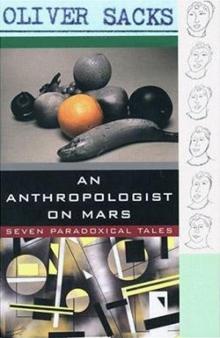 An Anthropologist on Mars: Seven Paradoxical Tales
An Anthropologist on Mars: Seven Paradoxical Tales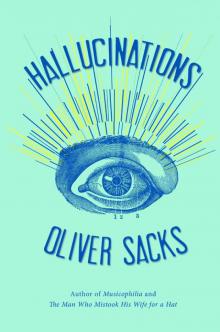 Hallucinations
Hallucinations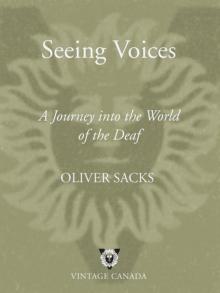 Seeing Voices
Seeing Voices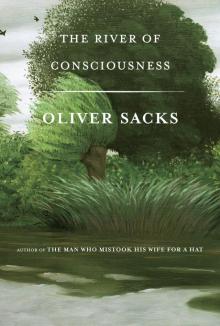 The River of Consciousness
The River of Consciousness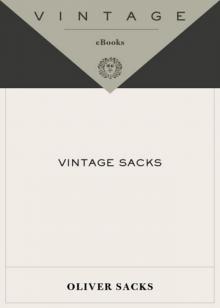 Vintage Sacks
Vintage Sacks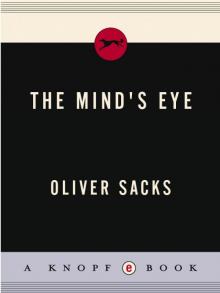 The Mind's Eye
The Mind's Eye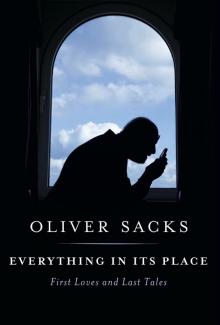 Everything in Its Place
Everything in Its Place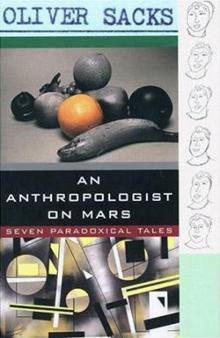 An Anthropologist on Mars (1995)
An Anthropologist on Mars (1995)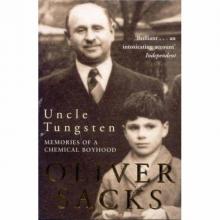 Uncle Tungsten: Memories of a Chemical Boyhood (2001)
Uncle Tungsten: Memories of a Chemical Boyhood (2001)